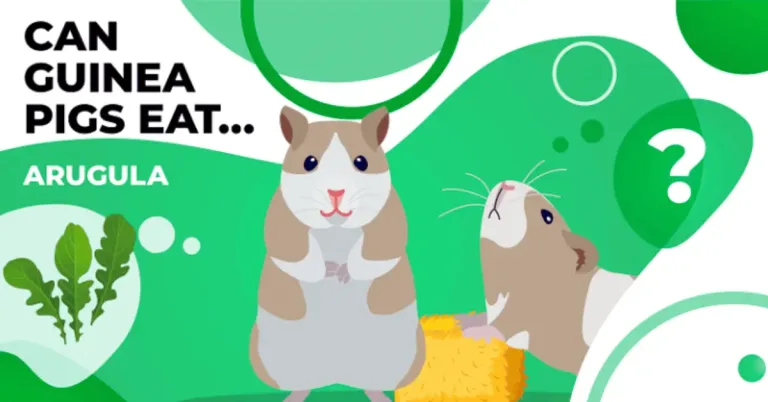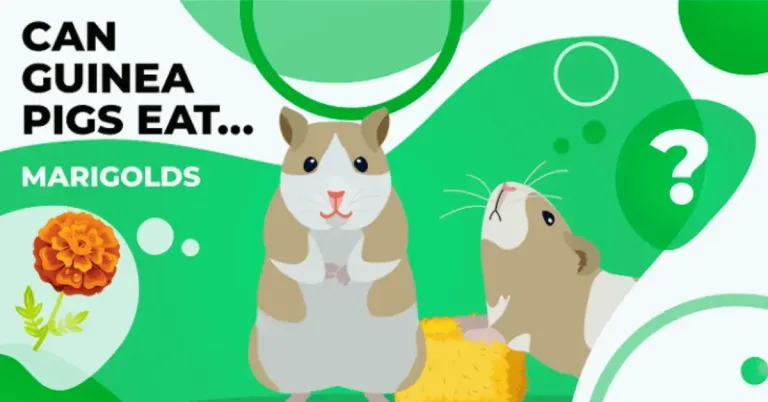Yes, Guinea Pigs Eat Watercress. This plant tastes a bit peppery and has lots of Vitamin C, A, and K. It’s important to feed it in the right amount to avoid problems. Even though some people call it a weed, guinea pigs really like it as a snack. Mix it with other vegetables to make your guinea pigs happy. Find out how fast it grows, why it’s good to add to their food, and get all the details about the good and not-so-good things.
Make your guinea pigs’ meals better with tasty watercress. In this post discuss all about this delicious treat for your guinea pigs. In this post, we delve into all aspects of this delicious treat for your guinea pigs.
Understanding Watercress
Watercress is a special plant that grows in water. Imagine it as a green treasure for our little friends, the guinea pigs. The name “Watercress” comes from the Greek words “Nasturtium officinale.” It’s like a green jewel that likes to live near clear streams and little rivers.
Guinea Pigs Eat Watercress and enjoy its fresh taste. This plant loves water because it’s designed that way by nature. It grows well along the edges of streams, showing how much it loves water. Examining its growth closely, watercress has a remarkable ability to grow rapidly, making it an ideal and quick treat for guinea pigs who are ever eager for a delicious snack.
Benefits of Watercress for Guinea Pigs
Are you curious about how watercress can make your guinea pigs healthier and happier? Let’s explore the key vitamins and minerals present in watercress and how they are important for the health of your furry friends.
Vitamin C Boosts Immune Health
Watercress, containing 43 mg of Vitamin C per 100 g, plays an important role in enhancing your guinea pigs’ immune systems. It aids their white blood cells in fighting off sickness and assists in the absorption of iron. Whether you are a guinea pig expert or a new piggy owner, keeping their immune system strong is vital for their overall health.
Guinea Pigs Eat Watercress: Calcium for Bone Growth
Watercress is rich in calcium, containing 120 mg per 100 g. It’s excellent for helping your guinea pigs grow strong bones. However, we need to be careful, especially with young, old, or pregnant guinea pigs. Calcium is important for their bones, and while watercress is good for them, it’s crucial to maintain a balanced approach to avoid overconsumption. This is especially important during specific life stages, such as growth, aging, or pregnancy. Providing the right amount ensures that adding watercress to their diet brings benefits without the potential risks of excessive calcium intake.
Tip
Include 5-10 sprigs of watercress in your guinea pig’s diet, but avoid serving it as a regular food.
Phosphorus Balances Calcium
Watercress, rich in phosphorus with 60 mg per 100 g, is a valuable addition to your guinea pigs diet. This essential mineral collaborates with calcium to support bone growth and maintenance, ensuring strong bones and teeth. But, it’s important to have the right balance of calcium and phosphorus to avoid problems with their urinary tract. When you give your guinea pigs watercress, you’re not only giving them the benefits of phosphorus but also making their meals better. As responsible guinea pig owners, maintaining a diverse and well-balanced diet contributes to their long-term health and happiness.

Nutrient Breakdown (per 100g)
100 grams of Watercress contains:
| Nutrient | Amount |
| Vitamin A | 160 µg |
| Vitamin C | 43 mg |
| Folate | 9 µg |
| Iron | 0.2 mg |
| Calcium | 170 mg |
| Vitamin K | 120 µg |
| Vitamin E | 1 mg |
| Sugar | 0.2 g |
| Fat | 0.1 g |
Essential Nutrients in Watercress
These are the Essential Nutrients in Watercress that plays an important role for your Guinea Pigs:
- Vitamin A: Vital for growth, development, and immune function.
- Vitamin C: Essential for tissue repair and immune system function.
- Vitamin K: Supports healthy bones, tissues, and blood clotting.
- Folate: Involved in maintaining normal blood levels of amino acid homocysteine.
- Calcium: Aids in maintaining blood pressure and bone and tissue formation.
Is Watercress Safe for Guinea Pigs?
Yes, watercress is beneficial for guinea pigs when given to them in moderation. Since they cannot produce Vitamin C on their own, watercress plays an important role and becomes an excellent source of this essential nutrient. Additionally, its richness in Vitamin A makes it a valuable choice for meeting guinea pigs’ nutritional requirements.
Health Benefits of Feeding Watercress to Guinea Pigs:
- Tissue Repair: Watercress, with plenty of Vitamin C, helps with tissue repair and supports immune functions.
- Hydration: The palatable and juicy nature keeps guinea pigs hydrated, though fresh water should still be provided.
- Immune Boost:
Watercress has a lot of Vitamin C, and when guinea pigs eat it, it helps their immune system become stronger. - Disease Prevention: Antioxidants in watercress help to prevent sickness and keep the guinea pigs from getting swollen or sick.
- Cholesterol Regulation: Dietary fiber in watercress helps make cholesterol lower, which is good for the heart.
- Inflammation Reduction: Nitrates in watercress help to stop long-term swelling, making sure your guinea pig stays well.
Feeding Guidelines
Feeding watercress to your guinea pigs can be really good for them, but it’s important to do it the right way. Even though Guinea Pigs Eat Watercress happily, it’s important to be careful and give it to them in moderation.
Adding 5-10 sprigs of watercress to their meals can be a good idea. But, be cautious, especially if your guinea pig is young, old, or pregnant. This helps them get the good stuff from watercress without it causing any problems.
Moderation is the key to preventing your guinea pigs from potential health issues. Excessive consumption may cause stomach problems, such as bloating, diarrhea, or vomiting. As responsible pet owners, maintaining the right balance guarantees a delightful and healthful experience for your pet guinea pig.
Possible Health Risks and Precautions
Guinea pigs eat watercress and really like eating it, but before giving them, we need to know about some things that might not be good for them. Here’s what you should keep in mind to make sure your guinea pigs stay happy and healthy.
Digestive Issues
If your guinea pig eats too much watercress, it might cause stomach problems like bloating, diarrhea, or vomiting. Watch out for these signs, and if they happen, give your guinea pig plenty of water. Most times, they’ll be okay. But if things don’t get better, it’s best to see a vet for help.
Acidity Concerns
Watercress has some acidity, which can make your guinea pig’s stomach uncomfortable. It’s not easy to notice, so pay attention to your guinea pig’s behavior. If they seem uncomfortable, give them more water. If things don’t improve, it’s a good idea to see a vet.
Balancing the Diet
While watercress is tasty for guinea pigs, it’s important not to give them too much. Keeping a good balance helps prevent health issues. Pay attention to what your guinea pig likes, and make sure they enjoy their food without any problems.
Consulting a Vet
Caring for your guinea pigs involves more than just providing their regular meals, especially when introducing specific foods like watercress. While Guinea Pigs Eat Watercress eagerly, it’s important to understand the valuable role vets play in keeping them healthy.
If you notice any health issues or unusual behaviors in your guinea pigs, seeking advice from a professional vet is crucial. A vet can provide personalized guidance on how to include watercress in your guinea pig’s diet, taking into account their individual needs.
Vets play an essential role in understanding the unique requirements of each guinea pig. They evaluate their overall health, nutritional needs, and any specific factors that might affect the introduction of watercress or other foods.
Professional vet advice ensures that your guinea pigs receive the best care tailored to their specific conditions. This approach not only addresses current concerns but also contributes to preventive care, promoting the long-term health and happiness of your guinea pigs. Always remember, when it comes to your guinea pigs’ well-being, a vet’s expertise complements your efforts in providing a balanced and nutritious diet.
Can guinea pigs eat watercress both the leaves and stems?
Yes, guinea pigs can enjoy the entire watercress, including both the leaves and stems. Its a delicious treat for guinea pigs especially for hairless guinea pigs. However, before serving, it’s crucial to remove any roots or spoiled parts. Ensure the watercress is thoroughly washed to eliminate any pesticides or contaminants. Introduce watercress gradually into your guinea pigs’ diet, observing their response, and consistently monitor their overall health and well-being.

Facts about Watercress
Here are some facts about watercress:
- Watercress has a long history. People from a long time ago, like the Romans, Greeks, and Persians, used it.
- Beyond being delicious in meals, watercress has also been used for medicinal purposes, like freshening breath.
- In older days, it was believed that watercress was used for healing and thought it could cure blood disorders, highlighting its early recognition for medicinal uses.
- The cultivation of watercress in England began in the early 1800s, marking its historical agricultural significance.
- Watercress is believed to have aphrodisiac qualities, enhancing its romantic reputation.
- Watercress soup became popular in the 17th century and is now considered a classic dish in Britain.
- Watercress remains a vital component of Mediterranean diets, originating from ancient Greece, prized for its flavor and nutrients.
- Watercress shares botanical connections with other pungent greens as it is part of the mustard family.
- Soldiers in ancient times consumed watercress for its perceived health benefits, believing it contributed to their well being.
FAQ’s
What is watercress?
Guinea pigs eat watercress and it is a leafy green vegetable known for its peppery taste and vibrant appearance.
Can guinea pigs eat watercress?
Yes, guinea pigs can enjoy watercress in moderation as part of a balanced diet.
Are there any health benefits to consuming watercress?
Guinea pigs eat watercress and it is known for its potential health benefits, including being a good source of antioxidants and supporting bone health.
Can guinea pigs eat watercress every day?
Guinea pigs eat watercress but it is not recommended to feed it to them every day. Moderation is key to prevent potential digestive issues.
How should watercress be prepared for guinea pigs?
Guinea pigs eat watercress but wash watercress properly to remove pesticides or contaminants. Remove any roots or spoiled parts before serving.
Conclusion
Allowing guinea pigs to eat watercress can bring various benefits, but it’s important to be careful. This green addition to their food has a rich history and can be a tasty treat. However, it’s crucial to be cautious and think about each guinea pig’s likes and health. As responsible pet owners, accepting that guinea pigs eat watercress opens the door to a culinary adventure that blends history, well-being, and the happiness of satisfying our pets’ unique preferences. Maintaining a balance and staying watchful guarantees a healthy and enjoyable dining experience for these beloved companions.







